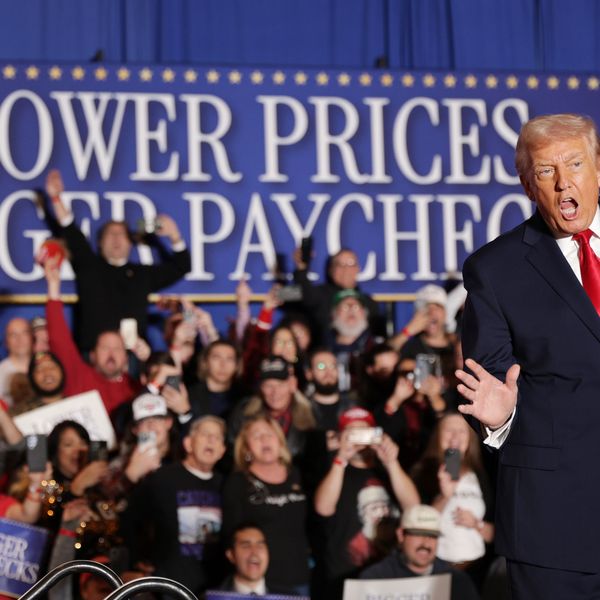
"Both budget proposals contained hundreds of billions more in cuts to food assistance, income security, education, and more." (Photo: Shutterstock)
Scoring Trump's Tax Cuts So Far: $280k for Rich Lawmakers, Pennies for Working People
Very few businesses have raised wages thanks to corporate tax cuts, but executives and lawmakers are buying new yachts
The Trump-GOP tax law was sold as a boon for the middle class. But many months after its passage, there are no signs that working Americans are getting the pay raise they were promised.
The Trump administration claimed the corporate tax cuts would eventually lead to wage increases of up to $9,000 a year for ordinary workers. But so far, workers' wages remain stagnant.
Tracking by Americans for Tax Fairness shows that only about 400 out of America's 5.9 million employers have announced any wage increases or one-time bonuses related to the tax cuts. That's about 0.007 percent.
In fact, real wages have actually declined since last year after accounting for higher gas prices, prescription drug prices, and other rising costs.
If that weren't bad enough, Trump and the GOP now want to come after the services that working families rely on.
Shortly after signing the tax cut package that will add nearly $2 trillion to the deficit over a decade, Trump proposed a budget that would cut $1.3 trillion for Medicare, Medicaid, and the Affordable Cart Act. The House Republican budget went even further, proposing $2.1 trillion in health care cuts.
Both budget proposals contained hundreds of billions more in cuts to food assistance, income security, education, and more.
Working families are seeing little benefit from the Trump-GOP tax giveaway -- and would be devastated by the cuts to services that have been proposed to help pay for it. But a few people are basking in their new tax-cut windfalls:
President Trump: Though he claimed his tax plan would "cost him a fortune," the new law will undoubtedly make him one.
Trump refuses to release his tax returns, so we can't know his exact savings. But he'll benefit greatly from the lower top individual tax rate, the lower corporate tax rate, and especially from the 20 percent deduction for "pass-through" business income (income from S corporations, partnerships, limited liability companies, and sole proprietorships that's taxed at the individual rather than the corporate level).
The Trump Organization, which is a collection of 500 pass-throughs, could save over $20 million a year from that deduction alone. And the law gifted Trump's industry -- real estate -- with myriad new loopholes.
Members of Congress: 53 Republican members of Congress who voted for the law could each enjoy $280,000 a year in tax cuts on average.
This includes millions of dollars each for Representatives Vern Buchanan (R-FL) and Diane Black (R-TN), who serve on the committee that wrote the law. The day that Rep. Buchanan -- who could get up to $2.1 million in annual tax cuts -- voted in favor of the tax cut bill, he rewarded himself with a multi-million-dollar yacht.
Big Pharma: Prescription drug companies have profited handsomely in recent years by price-gouging customers and public health programs like Medicare and Medicaid. They also shifted lots of those profits offshore to avoid U.S. taxes.
The Trump-GOP tax law rewards Big Pharma for its years of offshore tax avoidance with a steep discount on the amount due on its stash of offshore profits. Americans for Tax Fairness estimates the 10 largest American drug firms will save a collective $76 billion from this provision alone.
Big Pharma will also benefit from the new lower corporate tax rate and a new international tax regime that taxes future foreign profits at half the domestic profits rate.
While this elite group of tax-law winners are enjoying their tax-cut spoils, the majority of Americans are left holding the bag.
An Urgent Message From Our Co-Founder
Dear Common Dreams reader, The U.S. is on a fast track to authoritarianism like nothing I've ever seen. Meanwhile, corporate news outlets are utterly capitulating to Trump, twisting their coverage to avoid drawing his ire while lining up to stuff cash in his pockets. That's why I believe that Common Dreams is doing the best and most consequential reporting that we've ever done. Our small but mighty team is a progressive reporting powerhouse, covering the news every day that the corporate media never will. Our mission has always been simple: To inform. To inspire. And to ignite change for the common good. Now here's the key piece that I want all our readers to understand: None of this would be possible without your financial support. That's not just some fundraising cliche. It's the absolute and literal truth. We don't accept corporate advertising and never will. We don't have a paywall because we don't think people should be blocked from critical news based on their ability to pay. Everything we do is funded by the donations of readers like you. Will you donate now to help power the nonprofit, independent reporting of Common Dreams? Thank you for being a vital member of our community. Together, we can keep independent journalism alive when it’s needed most. - Craig Brown, Co-founder |
The Trump-GOP tax law was sold as a boon for the middle class. But many months after its passage, there are no signs that working Americans are getting the pay raise they were promised.
The Trump administration claimed the corporate tax cuts would eventually lead to wage increases of up to $9,000 a year for ordinary workers. But so far, workers' wages remain stagnant.
Tracking by Americans for Tax Fairness shows that only about 400 out of America's 5.9 million employers have announced any wage increases or one-time bonuses related to the tax cuts. That's about 0.007 percent.
In fact, real wages have actually declined since last year after accounting for higher gas prices, prescription drug prices, and other rising costs.
If that weren't bad enough, Trump and the GOP now want to come after the services that working families rely on.
Shortly after signing the tax cut package that will add nearly $2 trillion to the deficit over a decade, Trump proposed a budget that would cut $1.3 trillion for Medicare, Medicaid, and the Affordable Cart Act. The House Republican budget went even further, proposing $2.1 trillion in health care cuts.
Both budget proposals contained hundreds of billions more in cuts to food assistance, income security, education, and more.
Working families are seeing little benefit from the Trump-GOP tax giveaway -- and would be devastated by the cuts to services that have been proposed to help pay for it. But a few people are basking in their new tax-cut windfalls:
President Trump: Though he claimed his tax plan would "cost him a fortune," the new law will undoubtedly make him one.
Trump refuses to release his tax returns, so we can't know his exact savings. But he'll benefit greatly from the lower top individual tax rate, the lower corporate tax rate, and especially from the 20 percent deduction for "pass-through" business income (income from S corporations, partnerships, limited liability companies, and sole proprietorships that's taxed at the individual rather than the corporate level).
The Trump Organization, which is a collection of 500 pass-throughs, could save over $20 million a year from that deduction alone. And the law gifted Trump's industry -- real estate -- with myriad new loopholes.
Members of Congress: 53 Republican members of Congress who voted for the law could each enjoy $280,000 a year in tax cuts on average.
This includes millions of dollars each for Representatives Vern Buchanan (R-FL) and Diane Black (R-TN), who serve on the committee that wrote the law. The day that Rep. Buchanan -- who could get up to $2.1 million in annual tax cuts -- voted in favor of the tax cut bill, he rewarded himself with a multi-million-dollar yacht.
Big Pharma: Prescription drug companies have profited handsomely in recent years by price-gouging customers and public health programs like Medicare and Medicaid. They also shifted lots of those profits offshore to avoid U.S. taxes.
The Trump-GOP tax law rewards Big Pharma for its years of offshore tax avoidance with a steep discount on the amount due on its stash of offshore profits. Americans for Tax Fairness estimates the 10 largest American drug firms will save a collective $76 billion from this provision alone.
Big Pharma will also benefit from the new lower corporate tax rate and a new international tax regime that taxes future foreign profits at half the domestic profits rate.
While this elite group of tax-law winners are enjoying their tax-cut spoils, the majority of Americans are left holding the bag.
The Trump-GOP tax law was sold as a boon for the middle class. But many months after its passage, there are no signs that working Americans are getting the pay raise they were promised.
The Trump administration claimed the corporate tax cuts would eventually lead to wage increases of up to $9,000 a year for ordinary workers. But so far, workers' wages remain stagnant.
Tracking by Americans for Tax Fairness shows that only about 400 out of America's 5.9 million employers have announced any wage increases or one-time bonuses related to the tax cuts. That's about 0.007 percent.
In fact, real wages have actually declined since last year after accounting for higher gas prices, prescription drug prices, and other rising costs.
If that weren't bad enough, Trump and the GOP now want to come after the services that working families rely on.
Shortly after signing the tax cut package that will add nearly $2 trillion to the deficit over a decade, Trump proposed a budget that would cut $1.3 trillion for Medicare, Medicaid, and the Affordable Cart Act. The House Republican budget went even further, proposing $2.1 trillion in health care cuts.
Both budget proposals contained hundreds of billions more in cuts to food assistance, income security, education, and more.
Working families are seeing little benefit from the Trump-GOP tax giveaway -- and would be devastated by the cuts to services that have been proposed to help pay for it. But a few people are basking in their new tax-cut windfalls:
President Trump: Though he claimed his tax plan would "cost him a fortune," the new law will undoubtedly make him one.
Trump refuses to release his tax returns, so we can't know his exact savings. But he'll benefit greatly from the lower top individual tax rate, the lower corporate tax rate, and especially from the 20 percent deduction for "pass-through" business income (income from S corporations, partnerships, limited liability companies, and sole proprietorships that's taxed at the individual rather than the corporate level).
The Trump Organization, which is a collection of 500 pass-throughs, could save over $20 million a year from that deduction alone. And the law gifted Trump's industry -- real estate -- with myriad new loopholes.
Members of Congress: 53 Republican members of Congress who voted for the law could each enjoy $280,000 a year in tax cuts on average.
This includes millions of dollars each for Representatives Vern Buchanan (R-FL) and Diane Black (R-TN), who serve on the committee that wrote the law. The day that Rep. Buchanan -- who could get up to $2.1 million in annual tax cuts -- voted in favor of the tax cut bill, he rewarded himself with a multi-million-dollar yacht.
Big Pharma: Prescription drug companies have profited handsomely in recent years by price-gouging customers and public health programs like Medicare and Medicaid. They also shifted lots of those profits offshore to avoid U.S. taxes.
The Trump-GOP tax law rewards Big Pharma for its years of offshore tax avoidance with a steep discount on the amount due on its stash of offshore profits. Americans for Tax Fairness estimates the 10 largest American drug firms will save a collective $76 billion from this provision alone.
Big Pharma will also benefit from the new lower corporate tax rate and a new international tax regime that taxes future foreign profits at half the domestic profits rate.
While this elite group of tax-law winners are enjoying their tax-cut spoils, the majority of Americans are left holding the bag.

